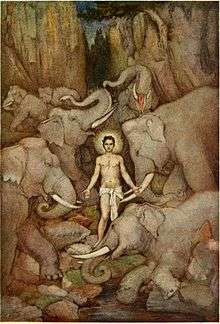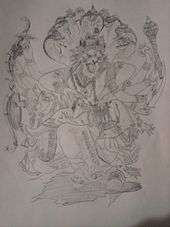Prahlada
| Prahlada | |
|---|---|
 Prahlada overcoming the elephant | |
| Information | |
| Children | Virochana |
prahlada (Sanskrit: Prahlāda, प्रह्लाद) is a male name that means "filled with joy" or "excess in joy." It is the name of a figure in Vedic literature, most notably the Srimad Bhagavatam. In the literature, Prahlada was a daitya king, the son of Hiranyakashipu, and the father of Virochana. He is often described as a saintly boy from the Puranas known for his piety and bhakti to Lord Vishnu. Despite the abusive nature of his father, Hiranyakashipu, he continued his devotion towards Lord Vishnu.[1] He is considered to be a mahājana, or great devotee, by followers of Vaishnava traditions and is of special importance to devotees of the avatār Narasiṁha. A treatise is accredited to him in the Bhagavata Purana in which Prahlāda describes the process of loving worship to his Lord Vishnu. The majority of stories in the Puranas are based on the activities of Prahlāda as a young boy, and he is usually depicted as such in paintings and illustrations. However, after the liberation of his cursed father Hiranyakashipu, an incarnation of the otherwise divine being Jaya, Prahlada was ordained by Lord Narasimha as king of the globe, the subterranean realms, and the celestial skies. Prahlada is the name of some of the eternal beings residing in the supreme realm known by the name Goloka as per the Brahma Vaivarta and other like Vedic literatures -
Legend
_LACMA_M.82.42.8_(1_of_5).jpg)
Prahlāda was born to Kayadu and Hiranyakashipu, an evil daitya king who had been granted a boon that he could not be killed of anything born from a living womb, neither be killed by a man nor an animal, neither during the day nor at night, neither indoors nor outdoors, neither on land, nor in the air nor in water and of no man made weapon! However, after repeated attempts of filicide by Hiranyakashipu unto Prahlada, Prahlada was finally saved by Lord Narasimha, a prominent avatar of Vishnu who descended to demonstrate the quality of Divine rage and redemption by killing the demon king. The word "Narsimha" is derived from the hindu word" nar" meaning Man and "simaha" meaning lion.[2] Thus Narsimha to a being who is half man and half lion.Lord Narasimha, being the transcendental Supreme Personality of Godhead, fulfilled all the proper requirements by which the otherwise nearly-invincible Hiranyakashipu could be killed.
After the death of his father, Prahlada took his father's kingdom and ruled peacefully and virtuously. He was known for his generosity and kindness. He sowed similar seeds in his son Virochana and grandson Mahabali.
The story of Prahlada

Prahlada while being in his mother's womb got to hear Narada's chants. He was taught by Narada in early childhood. As a result, he was devoted towards Vishnu. His father didn't like his spiritual inclination. He tried to warn Prahlada. Despite several warnings from his father Hiranyakashipu, Prahlāda continued to worship Vishnu instead. His father then decided to commit filicide and poison Prahlāda, but he survived. He then trampled the boy with elephants, but the boy still lived. Then he put Prahlāda in a room with venomous snakes, and they made a bed for him with their bodies.
Holika, the sister of Hiranyakashipu, was blessed in that she could not be hurt by fire. Hiranyakashipu puts Prahlāda on the lap of Holika as she sits on a pyre. Prahlāda prays to Vishnu to keep him safe. Holika then burns to death as Prahlāda is left unscathed. This event is celebrated as the Hindu festival of Holi.[3]
After tolerating abuse from Hiranyakashipu, Prahlāda is eventually saved by Narasiṁha, Lord Vishnu in the form of a man-lion chimera, who places the king on his thighs, and kills him with his sharp nails at the entrance to his home at dusk, thus nullifying all of Hiranyakashipu's boon of virtual immortality.[4]
There is an underground pillar known as "Prahlāda khamba" in Dharahra village, in the Purnia District of Bihar, India. It is said to be the pillar from which Narasiṁha manifested to kill Hiranyakashipu. Adjacent to the pillar is a large temple devoted to Lord Narasiṁha. Allegedly, attempts to excavate or move the "Prahlāda khamba" have failed. In Maharashtra, an underground temple near the banks of the river Krishna in Sangli District hosts a beautiful stone carved sculpture of "Narasimha and Laxmi".
The story of Prahlāda teaches that:
- Faith in God is paramount.
- Devotion can be practiced at any age.
- God is omnipresent.
- God will always prevail.
- God saves his devotees.
- Evil will be punished.
Prahlāda eventually becomes king of the daityas and attains a place in the abode of Vishnu (Vaikuntha) after his death.[5]
Scriptural references
In the Bhagavad Gita (10.30) Krishna makes the following statement in regard to Prahlāda, showing his favour towards him:
Translation: "Among the Daitya demons I am the devoted Prahlāda, among subduers I am time, among beasts I am the lion, and among birds I am Garuda."[6]
Later life
Because of his steadfast devotion towards Lord Vishnu as well as under the teachings of Shukracharya, Prahlada became the mighty king of the Asuras. Prahlada was even more powerful than his father, Hiranyakashipu ever was. He enjoyed the love and respect of his subjects. Even Ravana was a weakling before the powerful Prahlada.
Without lifting a single weapon, and by virtue of his good behaviour, Prahlada conquered the three worlds easily and Indra ran away from the Heavens. Indra then deceived Prahlada into giving him the power of his behaviour and Prahlada lost control of the three worlds.
The Asuras grew angry at the Devas for taking advantage of their King's virtuous behaviour and invaded the heavens. The Devas, afraid of the Asuras, enlisted the help of human Kings such as Yayati, Raji and Kakutstha and defeated them.
Prahlada always served thousands of Brahmins daily. One day, out of ignorance, Prahlada forgot to serve one Brahmin. The latter cursed the Asura that he would forget Vishnu and become unrighteous. The curse would be broken if Vishnu defeated Prahlada.
Prahlada then personally attacked the gods and defeated Indra in battle, forcing the King of the Gods to run for his life. Indra sought help of Lord Vishnu. Infused with his power, Indra defeated Prahlada. The latter understood that Vishnu was helping Indra in battle and he withdrew his forces. Prahlada first gave his kingdom to Andhaka, but the latter was defeated by Shiva. So Prahlada gave it to his son Virochana and undertook a Tirtha Yatra.
The Devi Bhagavatam narrates an incident, where Prahlada fought the Sages, Nara and Narayana. Prahlada attacked them because despite being ascetics and living in holy places, they practiced warrior duties, which was sinful, according to the Daitya King. Prahlada defeated Nara, but continuously fought against Narayana for 360,000 years. The fight ended in a draw. Lord Vishnu told Prahlada to desist from the fight as Nara-Narayana were the incarnations of himself.
When Prahlada found out that his blind and deformed cousin, Andhakasura, had overcome his disabilities and became mighty and invincible due to the boon of Lord Brahma, he voluntarily ceded his lordship over the Asuras to Andhaka and became a vassal. Prahlada, Virochana, Bali and Bana had fought against Lord Shiva and the other gods when Andhaka attacked Mt. Kailash. Prahlada had strongly advised to Andhaka against the invasion, but Andhaka refused. Andhaka was eventually defeated by Lord Shiva and Prahlada once more became King of the Asuras.
Prahlada was present during the churning of the ocean and also fought in the Tarakamaya war against the Devas.
Prahlada's son was Virochana, who was the father of Bali. The gods had Virochana killed by taking advantage of his generosity. Prahlada raised his grandson, Bali. Infuriated by Bali's arrogance, Prahlada rashly cursed him that he would lose his kingdom. Later on, Prahlada and Bali lived on Sutala Loka on instructions of Lord Vishnu.
It was Prahlada who asked Shukracharya to acquire the Mritasanjivani mantra from Lord Shiva, to save the Asuras from the Devas.
After a long life, Prahlada died of old age and attained Moksha. Prahlada's great grandson was the thousand armed Bana, who was humbled in battle by Krishna. Ultimately, as Prahlada can be considered to be a non-demonic being, and that the name represents the chosen representative of Sri Vishnu who is Krishna - Prahlada is not God - Prahlada simply is serving the god until maya puts him in his place so to speak - finally Moksha annihilates maya for those who have served successfully - for the Absolute Eternal Being named Prahlada, there is no controversy in respect to his constitution
Pilgrimage sites
The following sites in Andhra Pradesh, Telangana India, are associated with Prahlāda or Narasiṁha as places of pilgrimage:
In popular culture
The story of Prahlada has been the theme of various films, including Bhakta Prahlada (1931 film), which was first Telugu talkie movie made in 1931, followed by Bhaktha Prahlada (1942 film) (1942). In Kannada, the story has been portrayed in Bhakta Prahlada (1942 film), Bhakta Prahlada (1958 film) and Bhakta Prahlada (1983 film). Tamil films, Bhaktha Prahlada (1942) and Bhakta Prahlada (1967) both directed by Chitrapu Narayana Rao,[7] besides Malayalam film, Prahlada (1941), Hindi film, Bhakta Prahlad (1946) directed by Dhirubhai Desai and Bengali film Prahlad (1952).
See also
References
- ↑ "The story of Prahlada". Ramakrishnavivekananda.info.
- ↑ http://www.newworldencyclopedia.org/entry/Narasimha
- ↑ Varadaraja V. Raman - Variety in Religion And Science: Daily Reflections, iUniverse, 2005, ISBN 0-595-35840-3, p.259
- ↑ Dimmitt, Cornelia; Johannes Adrianus Bernardus Buitenen (1978). Classical Hindu Mythology: A Reader in the Sanskrit Purāṇas. translated by J. A. Van Buitenen. Temple University Press. p. 312. ISBN 0-87722-122-7.
- ↑ P. 452 The Hindu World: An Encyclopedic Survey of Hinduism By Benjamin Walker - Summary
- ↑ Archived 8 September 2005 at the Wayback Machine.
- ↑ G Dhananjayan (3 November 2014). Pride of Tamil Cinema: 1931 TO 2013: T. Blue Ocean Publishers. pp. 115–. GGKEY:L1DLZDAEJ47.
Further reading
- Cole, W. Owen; Judith Evans-Lowndes; Judith Lowndes (1995). The Story of Prahlad. Heinemann Educational. ISBN 0-431-07756-8.
External links
| Preceded by Hiranyakashipu |
Daityas unknown |
Succeeded by Virochana |

